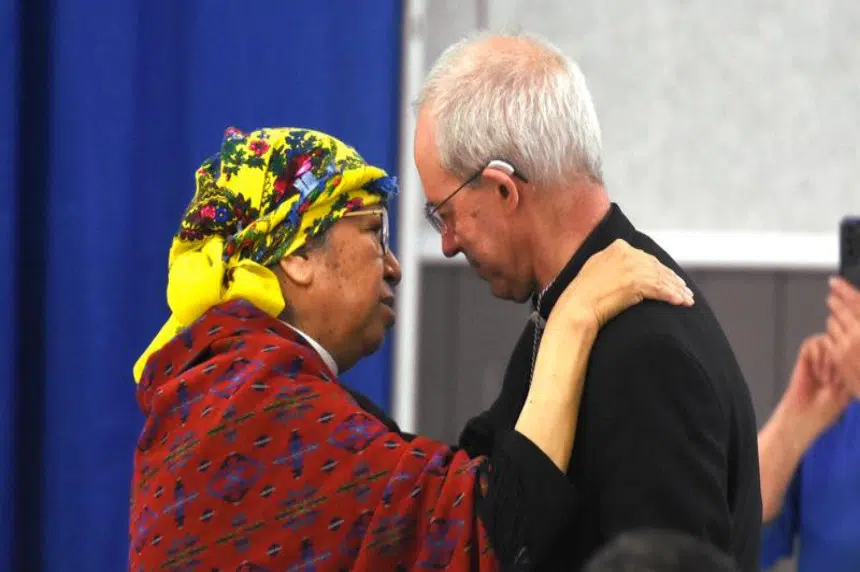By Jeff D’Andrea
For the second straight day, Most Rev. Justin Welby, the Archbishop of Canterbury, profusely apologized to residential school survivors, and vowed to collaborate to make sure their voices are heard and never forgotten.
But Welby took it a step further on Sunday at the Prince Albert Exhibition ground hall, while speaking in front of survivors, and Chiefs of the Prince Albert Grand Council (PAGC).
After some survivors talked about being abandoned by the Anglican churches they served because they were Indigenous, Welby said that act was against everything the Anglican Church is about.
“Without Indigenous people’s full participation of the church, the church is not fully the church of Christ. Without you, we are the less. We are inadequate,” Welby said, while holding the eagle feather he was gifted on Saturday at James Smith Cree Nation. “The communion is impoverished and we deny the reality of God. There is more to learn than I can say.”
Welby made it clear that his apologies were not enough, and that action needs to be taken. More discussion will be made at the Lambeth Conference this summer on what action will be taken.
When asked whether he was confident that some form of action would take place in the future, PAGC residential health support worker George Mirasty, who is a residential school survivor, said Welby has already taken action.
“I think just by being there and apologizing, that was action in of itself, to start doing something about all the ones that are still out there with the memories and the trauma, and also the young people with the intergenerational trauma that are going to their experience because their parents went through residential school. I feel for them,” Mirasty said, who added that Welby apologized to him personally before the event at James Smith even officially began.
When he just six years old, Mirasty thought he was just going on a quick, innocent car ride around his Sturgeon Lake home. He happily waved to his parents and his grandparents, having no idea he was going to the All Saints Indian Residential School in Prince Albert. He attended residential school for nine years.
Even after he left the school, it still affected Mirasty’s life.
“It wasn’t good the first few years because I was lost. I didn’t know how to love, I didn’t know how to say ‘I love you.’ I didn’t have my children come close to me, until I started my own healing journey. But I have to love myself first and I hope to do a lot of forgiveness.”
Now, Mirasty helps other residential school survivors and has worked with them for the past 15 years. To this day, Mirasty battles with flashbacks when hearing others share their experiences, but continues to help nonetheless.
“I’ve listened to their stories. I got triggered by my own [experience], by going to residential school myself. A lot of times during those hearings, it brought up memories where I had to go take time off, then go back into the meetings, and be a support to the ones telling their story of abuse and what happened to them,” Mirasty said.
The apology from somebody like the Archbishop of Canterbury goes a long way to restore that love and kindness. But Jospeh Tsannie, Vice-Chief with PAGC doesn’t just want the apology, he wants to be able to work and collaborate
“Stand beside me. Not in front of me, not above me. Stand beside me.”







